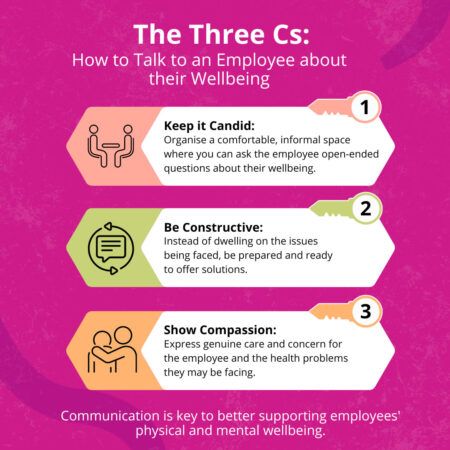In a busy office environment, employee health and wellbeing can sometimes be overlooked amidst ever-multiplying work demands and responsibilities. However, given their proximity to team members and regular involvement in day-to-day business operations, line managers have the power to ensure employee wellbeing remains a top priority. With keen observation and a compassionate approach, they can spot the warning signs of poor physical/mental health early on and be better prepared to intervene, working to support the affected employee and prevent escalation of the issue.
In the eleventh instalment of our line management blog post series, we’re explaining how you can navigate preventative health management strategies – from spotting the subtle signs of health issues amongst employees to proactively addressing your concerns.
You’re reading a blog post from our Line Management series
Below are links to all the posts in this series:
Spotting the Signs: The First Step to Preventing Serious Health Issues
Before mapping out any health-promoting initiatives or incorporating new resources into existing health and wellbeing strategies, line managers must be familiar with the signs of poor employee health. We’re all different, and every individual may exhibit different indicators of poor health, while on the other hand, some may be struggling without exhibiting any outward signs at all. However, there are some common warning signs all line managers should be aware of. These include:
- Sudden changes in physical appearance, i.e. rapid weight gain or loss.
- Persistent physical discomfort or musculoskeletal pain while performing routine tasks or sitting at their desk.
- Fatigue and chronic tiredness.
- Emotional changes, such as irritability, tearfulness, mood swings, or sudden outbursts.
- Decreased productivity – delayed response times, missed deadlines, and a noticeable deterioration in the quality of work.
- Withdrawal and/or isolation from colleagues.
- Change in communication patterns, i.e. difficulty in communicating their insights or thoughts, a loss of confidence in new ideas, and low levels of engagement in team discussions or meetings.
- Increased absenteeism, i.e. a regular or habitual absence from the office without notice or reason.
These signs are common indicators of poor employee mental and physical health.[ref 1] Being aware of them can help line managers notice changes in their team members’ behaviour, allowing them to approach these issues with appropriate nuance and an understanding of the underlying health problems that might be triggering them. Whilst line managers should never try to diagnose or speculate about their employees’ mental/physical health problems, they should always follow up on these warning signs and worrying behaviours. They should do this by providing effective intervention and signposting the affected individual to appropriate resources that can help them feel better, e.g., counselling services or medical referrals.
A recent study into workplace wellbeing surveyed 2025 employees across various professions and industries to learn more about the physical and mental health provision in their workplaces.
The responses revealed that 86% of respondents were dissatisfied with the level of health and wellbeing support provided by their employers.[Ref 2]
This is an overwhelming majority, highlighting just how important it is for line managers to take a proactive approach towards employee health management.]
Early Intervention: Why Line Managers Must Address Employee Health Issues
Once they are equipped to recognise signs of poor health in their employees, it’s really important for line managers to know how to intervene effectively with confidence and sensitivity. This intervention should involve taking active measures to help the affected employee and boost the overall physical and emotional health and wellbeing of the wider team.
Early intervention can allow line managers to:
- Demonstrate Proactive Support:
Early intervention allows line managers to support the affected employee by offering them effective resources and assistance to manage and alleviate their health problems. This can help bolster employee morale and boost the line manager’s reputation as a trustworthy leader who employees can know they can place their confidence in. - Build Trust:
By acting as first-line support and championing employee wellbeing, line managers can foster trust within their teams. When employees feel their line manager genuinely values their physical and mental wellbeing, they’ll be much more likely to approach them with other problems in the future without hesitation or worry. Such trust and confidence in management paves the way for stronger teams, increased commitment to roles and responsibilities, and higher employee retention rates. - Enhance Productivity:
Earlier detection and action usually mean earlier recovery. When line managers quickly provide struggling employees with resources and support, they can often help prevent their health problems from worsening into more serious or debilitating illnesses that prevent them from coming in to work/returning to the office after taking sick leave. By helping employees feel their best physically and mentally, line managers support them in delivering their best work. - Reduce Absenteeism:
Employees struggling with their mental and/or physical health may begin to take unexplained absences from work. Absenteeism can cause significant disruptions to work schedules as the regular absence of individuals can prevent entire teams from meeting targets and deadlines. Such delays and reduced performance levels can seriously compromise a business’s success.According to Public Health England, on average, illness-related absenteeism costs England £100 billion every single year.[Ref 3] By helping employees manage and/or recover from their health issues, line managers can help prevent their organisations from contributing to this figure.
Early intervention allows line managers to promote success on a team level and across the wider organisation. But what exactly is the first step line managers can take when they notice something isn’t right with one of their team members? The answer is simple: conversation.

Candid, Constructive, and Compassionate: How to Talk to an Employee about their Wellbeing
Once line managers spot the signs of poor health and wellbeing in one of their employees, it’s important that they know how to talk to them about their concerns.
To make these discussions as productive and sensitive as possible, line managers should follow our Candid, Constructive, and Compassionate Conversation framework:
- Keeping it Candid: Setting is important. Before initiating a conversation with an employee about their wellbeing, line managers should organise a safe, neutral, and non-judgemental space where they can talk to the affected employee without being interrupted. A local coffee shop could offer a more informal, comfortable setting that’s removed from the pressures of the workplace. Once settled in this relaxed, casual setting, line managers should address specific observations and concerns to keep the conversation direct. Instead of asking for explanations about missed deadlines or deterioration in their quality of work, they should ask employees open questions, e.g., “How are you coping with your workload?”. This type of neutral question can encourage employees to share deeper insights instead of making them feel like they’re being put on the spot about their professional performance. An honest conversation also relies on confidentiality, so line managers must reassure employees that their personal information will not be shared with anyone else. This can make an employee feel better about opening up.
- Being Constructive: A constructive conversation requires line managers to focus on finding solutions rather than dwelling on the issues being faced. They should take a collaborative approach and ask the employee to help them restructure their targets and workloads to prevent their physical or mental health issues from worsening due to work-related stress, anxiety, or overwhelm. The key to a constructive conversation is preparation. Line managers should bring information about various support mechanisms and resources struggling employees can use. These could include counselling services or wellbeing programmes. Line managers should also clearly communicate any accommodations they can provide, e.g., flexible working arrangements, ergonomic equipment, or regular 1:1 ‘check in’ meetings. Did you know that we can offer you access to our extensive Health and Wellbeing Discovery Hub, an epicentre of health and wellbeing content, jam-packed with an ever-expanding variety of e-learning health resources? With our Hub’s extensive library of refreshing, interesting content, employees (and line managers!) can improve their awareness of mental and/or physical health issues whilst also learning how to better support their overall wellbeing with articles about nutrition, sleep, exercise, and so much more. The Hub is an accessible, time-saving, all-in-one resource which can be consulted by employees at any time.
- Remaining Compassionate: Above all, line managers must express genuine care and concern for their employee and their health problems. Line managers should always validate the affected employee’s emotions and worries, letting them know they understand what they’re going through and are there for them. The effectiveness of simple verbal and physical cues like nodding and using phrases like “I understand” shouldn’t be underestimated. By acknowledging the challenges a struggling employee might be facing, line managers can reassure the individual and demonstrate their empathy.
By structuring their conversations with employees around these three vital guidelines, line managers can affirm their commitment to workplace wellbeing and tailor their support to help employees with their specific health needs.
Health Management Resources and Guidance
At Thrive4Life, we can offer line managers a range of highly effective health management resources. These can help you identify the warning signs of poor employee health and take the most effective steps for early intervention and prevention.

The following 5 Thrive4Life resources are a brilliant place to start:
1. Employee Health and Wellbeing Discovery Hub: Discover the Thrive4Life online Discovery Hub, the ultimate health and wellbeing resource for your company, no matter its size. Say goodbye to the hassle, time, and expense of building and maintaining ongoing health support for your employees. The Hub’s primary goal is to ignite employee interest and proactivity in their own wellbeing. With an extensive range of captivating talks and articles covering stress management, sleep, exercise, nutrition, mental health, and other essential health-related topics, the Hub serves as a trusted, easily searchable library. You can also access live talks/recordings of talks led by health and wellbeing specialists and medical consultants. Furthermore, you can customise categories and content to fit your organisation’s specific needs, utilising the “Events” and “Noticeboard” pages to stay informed and connected. The Hub can be used on computers or phones, making it the best way to empower your employees with up-to-date health and wellbeing information whenever and wherever they need it. It’s the comprehensive, cost-effective solution you’ve been seeking.[Ref 4]
2. Wellbeing Champion Training: Our Wellbeing Champion training course involves training dedicated volunteers from your workforce to raise awareness and emphasise the importance of prioritising workplace mental and physical wellbeing. Our specialist instructors will equip these champions with the necessary tools to offer support to fellow employees and drive positive cultural change within your organisation. This will help them identify colleagues struggling with their mental or physical health, allowing them to guide these individuals towards appropriate resources. During this course, attendees will receive training about the various factors that could impact employee wellbeing in their workplace on a daily basis, aiming to empower participants with the communication skills needed to promote workplace health awareness and implement new initiatives to support the health and wellbeing of their colleagues.
Wellbeing Champions could be the in-house tools you need to challenge stigmas surrounding health and wellbeing and facilitate discussions on mental and physical wellbeing in your workplace today.[Ref 5]
3. Line Management Training – Managing Stress and Mental Health: Research shows that just 24% of managers have undergone formal mental health training. To address this gap, we offer a 90-minute Managing Stress and Mental Health training course for line managers that can be delivered online or in person. This course will give them the essential skills and confidence to effectively manage their team’s stress levels and overall mental health. By raising awareness of the factors that might affect their team members’ mental wellbeing on a daily basis, the course equips managers with knowledge of the best practices and support mechanisms they can use to implement a successful workplace mental health strategy that cultivates a supportive and productive working environment.[Ref 6]
4. Mental Health First Aider Course and Skills Development Programme: Our Mental Health First Aid course allows line managers to gain an MHFA accreditation as a Mental Health First Aider. The training and certification gained on completion of the course allow line managers to become a first-line, in-house mental health resource for employees struggling with any aspect of their emotional wellbeing.[Ref 7]
After completing our Mental Health First Aider course, line managers can further build on their mental health knowledge and skills training by attending a Mental Health Skills Development session. These sessions act as a top-up for Mental Health First Aiders’ mental health knowledge, keeping them up to date on current best practices, and giving them the opportunity to ask our highly-experienced mental health professionals for any advice on the challenges their employees might be facing.[Ref 8]
5. Employee Health Check: Thrive4Life’s 15-minute Mini Health Check is a straightforward way of monitoring key health measures like blood pressure, BMI, and cholesterol, helping employees keep an eye on their physical health and picking up on any early warning signs before they escalate. This assessment is conducted by medical professionals and can easily be carried out at your office or workplace. After just 15 minutes, employees and employers can come away with a much better understanding and awareness of their general health levels.[Ref 9]
In Summary:
Line managers can use their position to play a key role in transforming their workplaces for improved productivity and success. By recognising early warning signs, initiating compassionate conversations with struggling team members, and offering constructive support, they can ensure their team is the healthiest and happiest it can be. The tips and guidance highlighted in this blog post can help line managers best harness their power to bring care, compassion, and improved wellbeing to the forefront of their organisation.
External References/Links
- These indicators are drawn from the guidance of Dr Graeme Edwards (https://returntowork.workplace-mentalhealth.net.au/early-warning-signs-of-mental-health-problems-at-work/) and the American Psychiatric Association (https://workplacementalhealth.org/mental-health-topics/knowing-the-warning-signs).
- Employer Wellbeing Survey. Westfield Health. www.westfieldhealth.com/blog/employers-could-do-more-to-help-the-wellbeing-of-their-employees-survey
- UK Home Office – Workplace Health Guidance. www.gov.uk/government/publications/workplace-health-applying-all-our-health/workplace-health-applying-all-our-health#facts-about-workplace-health
- Employee Wellbeing Hub. Thrive4Life. – www.thrive4life.co.uk/health-wellbeing-promotion/health-and-wellbeing-discovery-hub/
- Wellbeing Champion Training. Thrive4Life. www.thrive4life.co.uk/health-wellbeing-training/wellbeing-champion-training/
- Line Management Training. Thrive4Life. www.thrive4life.co.uk/health-wellbeing-training/line-management-training/
- Mental Health First Aid Course. Thrive4Life. www.thrive4life.co.uk/health-wellbeing-training/mental-health-first-aider-course/
- Mental Health Skills Development Program. Thrive4Life. www.thrive4life.co.uk/health-wellbeing-training/development-skills-workshop-for-mental-health-first-aiders/
- Employee Health Checks – Know Your Numbers. Thrive4Life. www.thrive4life.co.uk/health-wellbeing-promotion/employee-health-checks/
- Lloyd’s Wellbeing Centre Blog: Non-Judgemental Listening www.lloydswellbeingcentre.co.uk/blog/non-judgemental-listening/
- Lloyd’s Wellbeing Centre Blog: Happiness is Good for Your Wellbeing www.lloydswellbeingcentre.co.uk/blog/happiness-is-good-for-your-wellbeing/
Please note, some of these are external links away from the Thrive4Life website. We are not responsible for the content of external websites.










